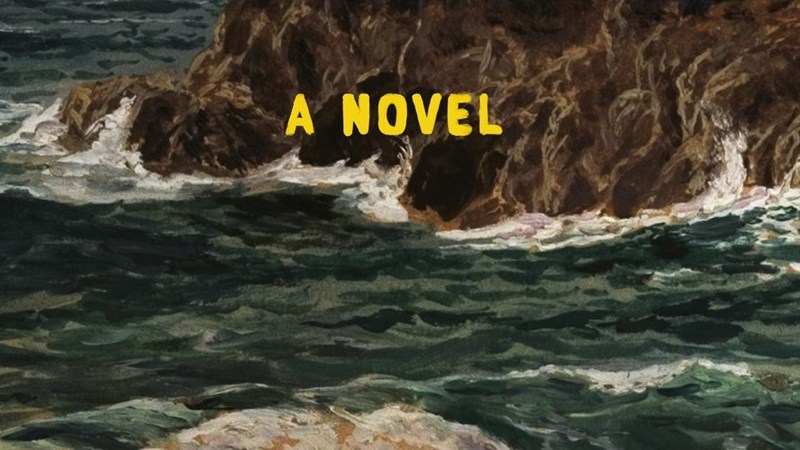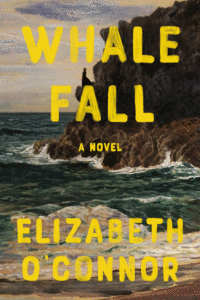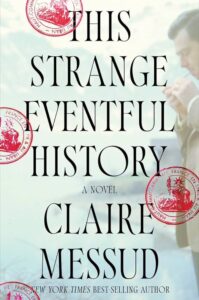
Our feast of fabulous reviews this week includes Sam Sacks on Colm Tóibín’s Long Island, Maggie Shipstead on Elizabeth O’Connor’s Whale Fall, Lara Feigel on Maggie Nelson’s Like Love, Jennifer Wilson on This Strange Eventful History, and Lauren LeBlanc on Kaliane Bradley’s The Ministry of Time.
“The plot may sound like the stuff of soap operas, but Mr. Tóibín is essentially a dramatist of repression. Exposing their feelings, openly acting on their desires, committing their hearts in one direction or another—such decisions are torments to this author’s characters and only come about awkwardly, when their longings or hurts overwhelm them. Irish Enniscorthy, much like Italian Lindenhurst, is an insular, gossipy place where every secret is eventually known by all yet might never be spoken out loud. The exceptionally acute feeling of suspense in Long Island comes not just from waiting to see what will become of Jim, Eilis and Nancy, but from the characters’ struggle to finally express themselves, despite the pain or regret it might bring them. It’s a tricky thing, producing a novel from a style this muted and undemonstrative … Yet the writing perfectly suits Brooklyn and Long Island, helping to capture the decency and ordinariness of the characters as well as the deep emotional ruptures that drive them toward disorder. The confrontations between these people, so long delayed, feel momentous and hugely affecting. These pendant novels, I think, will be the fiction for which this wonderful writer is best remembered.”
–Sam Sacks on Colm Tóibín’s Long Island (The Wall Street Journal)

“Can a novel be both blunt and exquisite? I’m not sure I would have known how to imagine such a work before reading Whale Fall, Elizabeth O’Connor’s excellent debut. Brief but complete, the book is an example of precisely observed writing that makes a character’s specific existence glimmer with verisimilitude … the novel does an exceptional job of getting at the tension between the big picture and the small one. To different eyes, the same island might look like a prison or a romantic enclave, but to actually apprehend the truth of a place or person requires patience, nuanced attention and the painstaking accrual of details. Understanding is hard work, O’Connor suggests, especially when we must release our preconceptions. While the researchers fail to grasp this, Manod does not, and her reward by book’s end, painfully earned, is a new and thrilling resolve.”
–Maggie Shipstead on Elizabeth O’Connor’s Whale Fall (The New York Times Book Review)
“A decade after The Argonauts became the bible of English graduates everywhere, the essays in Like Love arrive to help us understand Nelson’s place in a culture where, to her half-delight, she has become such a powerful voice. Spanning two decades, they range from appreciations of influences including Prince and Judith Butler, to wild, freefalling conversations with figures such as Björk, Wayne Koestenbaum and Jacqueline Rose. There is a passionate, wondering account of her formative half-erotic friendship with the singer Lhasa de Sela. The writing isn’t consistent, any more than her books are. But I like to take my thinkers and writers whole, as she does. The essays offer a kind of composite self-portrait, and illustrate how she thinks, sometimes painstakingly, sometimes with casual jubilance, about some of the central dilemmas of our time … Because Nelson likes writing about her friends, there’s a kind of homogeneity to much of the book that cumulatively left me feeling a little claustrophobic, longing especially for the roominess of time travel…Which is not to say that she’s wrong to write about the people in her circle. The brutality of the present moment may require us precisely to batten down the hatches and commit to extreme solidarity. At a time when institutional life is collapsing, when the pandemic privileged family over friends, when work expands in ways that leave many too exhausted to socialize, Nelson demonstrates what it means to dedicate yourself to a cohort with seriousness and strenuousness … Like Love may be one of the most movingly specific, the most lovingly unruly celebrations of the ethics of friendship we have.”
–Lara Feigel on Maggie Nelson’s Like Love (The Guardian)

“Messud lets the messiness of reality overflow the neatness of fiction, as if in defiance of this tendency. The novel brims with details, many likely gleaned from a fifteen-hundred-page family history, titled Everything That We Believed In, that her paternal grandfather left behind. Messud has used that document to craft something more interesting than a historical novel: a novel about history and the stories we tell ourselves about the role we play in it … Some readers will bristle at This Strange Eventful History and the pains it takes to account for the lost sense of belonging felt by the pieds noirs, who treated Algerians like strangers in their own land. One could accuse Messud of treating her family’s history like a family heirloom, which is to say, over-delicately. Messud is fond of quoting a piece of advice from the Russian writer Anton Chekhov. In 2020, she summarized it for the Web site Literary Hub, saying, ‘It’s not my job to tell you that horse thieves are bad people, it’s my job to tell you what this horse thief is like.’ Messud risks the accusations above to do her work well. In This Strange Eventful History, she unswervingly tells us what the pieds noirs are like—a people too homeless to feel responsible for squatting, too poor to see themselves as colonizers, too in love with their conquest to sense anything wrong with the liaison. The Cassars cling to an idealized memory of Algeria that’s untroubled by reality, the tree of knowledge unshaken, the apple still intact, but Messud trusts her readers to bite down.”
–Jennifer Wilson on This Strange Eventful History (The New Yorker)
“Of late, many critically acclaimed books embrace mystery and absurdity in a way that both suspends and expands conventionally held notions of time…Their playfulness reveals possibilities and perspectives that might be lost in a novel bound by fact-checked 21st century reality. After all, in a world where nothing feels normal, fiction that embraces a disregard for physics and convention mirrors our new upside-down quotidian lifeTo this end, Kaliane Bradley proves that it’s possible to address imperialism, the scourge of bureaucracy, cross-cultural conflict and the paranoia inherent in a surveillance state through her utterly entertaining novel … As the story’s momentum builds into that of a spy thriller, Bradley pulls off a rare feat. The Ministry of Time is a novel that doesn’t stoop to easy answers and doesn’t devolve into polemic. It’s a smart, gripping work that’s also a feast for the senses. An assassination, moles, questions of identity and violence wreak havoc on our happy lovers and the bubble they create in London. Yet our affection for them is as fresh and thrilling as theirs is for one another, two explorers of a kind, caught in a brilliant discovery. Bradley’s written an edgy, playful and provocative book that’s likely to be the most thought-provoking romance novel of the summer.”
–Lauren LeBlanc on Kaliane Bradley’s The Ministry of Time (The Los Angeles Times)
If you buy books linked on our site, Lit Hub may earn a commission from Bookshop.org, whose fees support independent bookstores.

